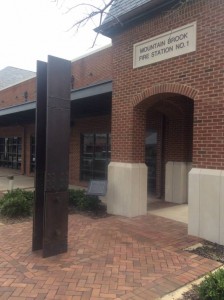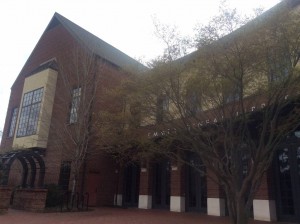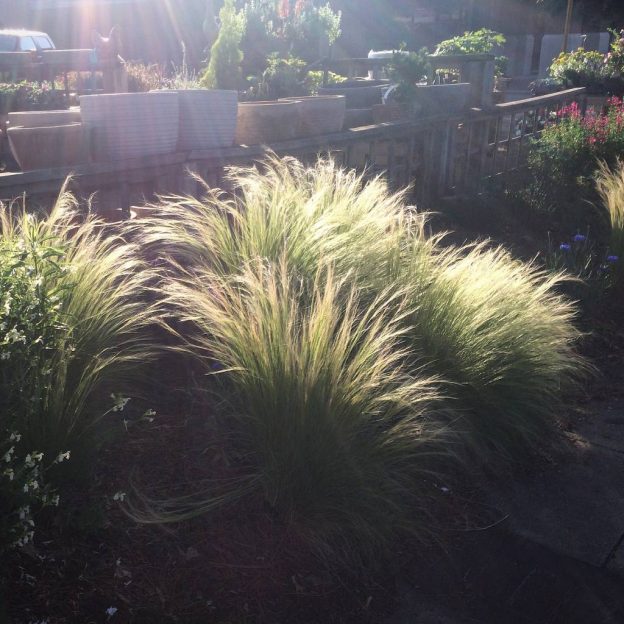The first 10 years of Oak Street Garden Shop were marked by slow and steady growth. Of course, any successful business has to “go with the flow” and roll with the sometimes sucker punches of weather, employee turnover, and unforeseen expenses.

9/11 memorial
The decade of the 2000’s certainly held its share of surprises though. It began with the national tragedy of 9/11, a memory seared into the collective conscience of every one of us. No one would have dreamed in Oak Street Garden Shop’s beginnings in 1990 that a piece of New York City’s World Trade Center would have a place directly across the street (many years after the tragedy, as part of a memorial in front of a newly constructed City Hall and fire station complex in the next decade), or that a completely rebuilt 2-story library would be completed in the spring of 2001, or that a devastating drought would bring the business to its knees, simultaneously giving birth to a recognized and respected ‘green industry’.

Emmet O’Neal Library
Looking back, it just doesn’t seem possible we lived through all of that and more. The old Emmet O’Neal library came down quickly and went up just as fast, though it began with the incessant pounding day after day after day of the piledrivers, driving deep into the Mountain Brook bedrock.
My head had never hurt so badly as it did those weeks of that early construction. The pounding continued in our heads even after we left for the day and the next day and the day after…until finally, blessedly, it ended and the building began to rise and rise and rise across the corner from Oak Street Garden Shop.
The one-two punch of an historic drought of 2007 and a downturn in the economy in 2008 were the next big tests of the now established business. Until 2007, the shop had been running like clockwork, and new customers continued to find our little shop across from the library.
Things were looking good. But then, in 2007, the rains stopped. Birmingham received barely 29 inches of rainfall – well below normal rainfall of nearly 54. A mere 31.85 inches fell in Atlanta, also well below the average, and Huntsville was just as bad. The entire southeast was going into a drought.
With such serious water shortages, the Birmingham Water Board directed the full force of its weight toward outdoor watering restrictions, and we found ourselves in the direct line of fire. Because the BWW publicly declared all garden related businesses “non-essential“, by their new rules we were not allowed to water even any of the very few plants we were stocking.
Put in the bluntest terms, since they considered our work “non-essential”, it wouldn’t matter to them if we went out of business. Billy Angell knew right away that, if he couldn’t convince the Mountain Brook City Council to create a special ordinance allowing Oak Street Garden Shop to water its plant inventory, he might as well close his doors for good.
It was a very scary and depressing time for us all. The stress was etched on Billy Angell’s face as he stood before the Mountain Brook city council that Tuesday evening. He had totaled all the water bills for Oak Street Garden Shop from the previous year – a grand total of $500. His personal home usage had been much more. Thankfully, the city leaders at the time valued Oak Street Garden Shop enough to allow the hand watering with hoses of our plants, a practice which continues to this day. It still surprises people that the amount of water we use irrigating plants is not more significant. In fact, we found hand irrigating to be even more efficient and eventually completely dismantled the irrigation system for good a few years later.
The battle certainly wasn’t over though, as the ripple effects of this historic drought were astounding. Many growers and nurseries, because of outright outdoor watering bans in surrounding areas and states, went out of business. We were witnessing the industry we had worked in for years casually tossed off as not worth listening to, helping, or being of any value at all to the community or state.
It was a mind-numbing thought. Garden shops and wholesale nurseries watched as car washes continued without restriction, though people were told they shouldn’t wash their cars so much. Large industrial plants continued to use enormous amounts of water unabated, and indoor usage of water was never threatened beyond suggestions of how to conserve water inside and the discussion of a tiered billing system.
In fact, by their rules, we could water with abandon inside the greenhouse. Of course, that hardly mattered since only a few were buying plants they’d have to water, be it inside or out. And, while we understood that cutting back on outdoor water usage was absolutely necessary, it seemed to us that a more balanced approach, and one which included the monitoring of indoor water usage in homes and businesses, needed to be a more focused part of the discussion. Clearly, and most importantly, our industry needed to join forces to prove our worth.
So, at this critical juncture in the shop’s history, Billy Angell found himself part of a small but determined group of nursery owners, growers, and industry leaders. They had watched with mounting concern the outright and complete water bans going into effect in the Atlanta area and in many other parts of Georgia and had seen the serious toll they were taking on the green industry in that state. They also remembered the outright water ban that had affected Birmingham during a drought in the fall of 2001. So, feeling as though they were fighting for their livelihoods, they persevered, going to and speaking out at many Birmingham Waterworks Board meetings, pushing for more even-handed conservation measures.
In large part due to this pressure, the water restrictions imposed did not include an outright ban. The drought continued into 2008 and segued into the downturn in the economy, so we all breathed a sigh of relief when the rains finally came again. This crisis had energized the Alabama Landscape and Nurseryman’s Association, though, and an economic impact study was commissioned which showed the extent of the newly-coined ‘Green Industry’s’ worth to the state of Alabama. Now there were solid numbers to back up our words.
What a decade, indeed…
By Kris Blevons
For me, 2007 and 2008 were difficult years for other reasons too. In June 2008, following the summer of the southeast drought, the Rock River in Wisconsin, where my parents’ home is (and where I grew up), went through historic and devastating flooding. For weeks their home, in Fort Atkinson, and many others were on the brink of being lost as torrential rains continued non-stop on top of soil saturated from more than 100″ of snowmelt. The stress was palpable for them, and for me too, being at such a distance and feeling so helpless. At the height of the flooding, as the river crested, my sister and brother-in-law drove to my parents’ home from theirs in Milwaukee to evacuate them if necessary. They made it across the final bridge as swiftly moving river water crept over the road. My parents’ home miraculously was spared, but thousands of people and many communities throughout the Midwest were severely impacted. Looking back now, the incredible juxtaposition of flood and drought and the effect both had on my life is still difficult to think about.
Do you have a favorite memory of Oak Street Garden Shop? We’re compiling thoughts from customers and vendors and will print them in a future blog post. Send us your thoughts, either by mail to Oak Street Garden Shop 115 Oak St. Birmingham, Al 35213 or by email to oakstreetgardenshop@gmail.com
We look forward to hearing from you!

